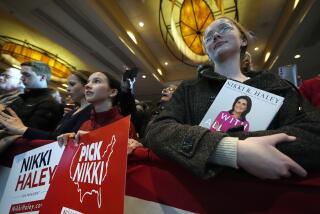Experts Say Rifts That Beat Bush Still Split Party
- Share via
HEMPSTEAD, N.Y. — The policy conflicts that helped defeat the last GOP president--mainly the tension between those Republicans dedicated to cutting the deficit and those focused on cutting taxes--still plague his party more than four years later.
This was one of the major themes that emerged from the first full-scale examination of the presidency of George Bush, a three-day conference at Hofstra University that concludes today.
But Republicans may find consolation and Democrats cause for concern in another political reality underlined at this gathering of scholars and Bush administration alumni. Conference participants agreed that the difficulties Bush encountered dealing with a Congress controlled by the opposition party are mirrored in the conundrums facing President Clinton as he squares off against the GOP-run House and Senate.
But for all such ruminations by those who know Bush best and have studied him longest, one aspect of the former president’s behavior remained a mystery. As James A. Baker III, his close friend of more than 40 years as well as his former secretary of State and campaign manager, put it: “I can’t figure out any better than the rest of you why in the world he would jump out of an airplane,” referring to Bush’s recent skydiving.
*
For the most part, those at the conference were preoccupied with a different sort of descent by Bush. Speaker after speaker sought to explain his plunge from an 89% approval rating among voters after the Persian Gulf War in 1991 to his loss to Clinton in 1992.
Bush’s defeat is widely attributed to his perceived failure to respond to the recession that crippled the nation’s economy during his presidency’s last two years. And as some here pointed out, Bush helped to dig his own political grave by reversing his “read-my-lips” promise not to raise taxes.
But as Richard G. Darman, Bush’s budget director, argued at one panel discussion, the president was handcuffed by the splits in his own party.
“In the post-Reagan period, the factional struggle for the body and soul of the Republican Party festered and often erupted among moderates, supply siders, austerity advocates, social conservatives, internationalists, populists, elitists and several other ‘ists,’ ” Darman said.
*
Attesting to the persistence of this fractiousness are the continuing skirmishes between various GOP contingents over tax and budget strategy, as well as recent polls showing sharp divisions among the party’s rank and file, not only on economic issues but on such social concerns as abortion.
Not only did Bush’s 1990 decision to raise taxes sharpen the divisions within his own party and hurt his credibility, but it also failed to accomplish its goal: significant deficit reduction. That was because the then-Democratic majorities in Congress refused to keep their part of the bargain, said Dennis Ippolito of Southern Methodist University. “The administration’s major concessions on tax policy . . . were not matched by congressional compromises on spending policy,” Ippolito contended.
More to Read
Get the L.A. Times Politics newsletter
Deeply reported insights into legislation, politics and policy from Sacramento, Washington and beyond. In your inbox twice per week.
You may occasionally receive promotional content from the Los Angeles Times.










